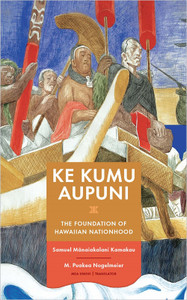
Nana I Ke Kumu (Look to the Source) is dedicated to the families and children of Hawaii. It is a source book of Hawaiian cultural practices, concepts and beliefs which illustrate the wisdom and dignity contained in the cultural roots of every Hawaiian child.
The Hawaiian lived for many years isolated from the rest of the world, with a viable culture that met the needs of a thriving, industrious and religious people. Then came the foreigner with his technology and Judeao-Christian culture. He saw the native beliefs as pagan and inferior, and superimposed his culture. In order to gain acceptance, avoid ridicule and disapproval, the Hawaiian gradually adapted to Western ways. However, he secretly hung on to some of the beliefs and ways of his own culture. The confusion in his sense of identity which resulted exists today. For many Hawaiian families today, only the negatives, often in garbled fashion, have persisted. This is complicated further by mergers or conflicts of Hawaiian convictions with other ethnic or religious precepts. Forgotten are the positives in the culture, such as: the importance of the family (‘ohana); the respect for seniors (kupuna); insuring harmonious interdependence within the ‘ohana through regular family therapy (ho‘oponopono); dealing with each successive layer of trouble (mahiki); forgiving fully and completely (mihi); and freeing each other completely (kala). It is this knowledge that the Hawaiian needs to recapture.
The objectives of this work are to provide factual information as accurately as possible in a subject that reaches back to unwritten history and legend, to clarify Hawaiian concepts, and to examine their applicability to modern life. Volume I culminates seven years of weekly meetings of study and research by the Culture Committee of the Queen Liliuokalani Childrens Center, a child welfare agency created by the Deed of Trust of Her Majesty Queen Liliuokalani, to provide services to children of Hawaiian and part-Hawaiian ancestry. This committee was started when, in our work with children and families, many Hawaiian concepts, beliefs and practices emerged. Our staff, confronted by these deeply felt beliefs, felt uncomfortable, and as a result avoided discussion and exploration, even though this hampered successful work in resolving family conflicts. This pointed to our need to learn and understand the authentic Hawaiian culture in order to increase our effectiveness in helping those we serve.
We are fortunate that Mrs. Mary Kawena Pukui, associate of the Bishop Museum, translator and author, agreed to be our kumu (this also means teacher). Her belief in our sincere wish to help our people and her recognition that cultural information was of great value, were the motivating factors behind her sharing her knowledge with us. She did express her concern that the concepts in this book not be misused or misunderstood to cause her people embarrassment. (For example, she was once severely criticized for writing an article on ho‘oponopono.) She believes the Hawaiian needs to understand and appreciate the soundness and beauty of his culture. We are deeply indebted to the contributions of Mrs. Pukui. Without her, this work could not have been done.
__________________________________________________________________
This third volume of Nānā i ke Kumu presents ancient and fundamental Hawaiian values and traditions associated with grieving and healing practices with the goal of addressing modern-day family conflicts, including drug addiction, abandonment, divorce, incarceration, and domestic violence. This book is intended to inspire those who work with Hawaiian families as well as individuals—teachers, clergy, medical practitioners, social workers, law enforcement, and community leaders. It will empower individuals who seek to integrate a more meaningful understanding of Hawaiian beliefs into their lives. The authors have strived to represent the collective mana‘o of Tūtū Pukui and their respective kūpuna, and the individuals with whom they have worked for decades.







